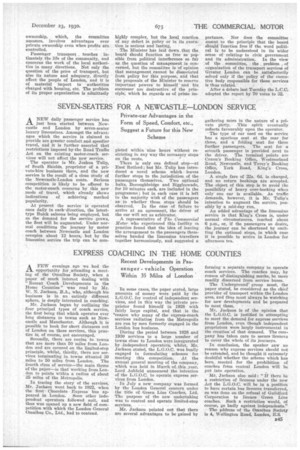EXPRESS COACHING IN THE HOME COUNTIES Recent Developments in Passenger
Page 59

If you've noticed an error in this article please click here to report it so we can fix it.
vehicle Operation Within 35 Miles of London AFEW evenings ago we had the opportunity for .attending a meeting of the Omnibus Society, when a paper of much interest dealing with "Recant Coach Developments in the Rome Counties" was read by Mr. W. N. Jackson, B.A., who, although his business is in an entirely different sphere, is deeply interested in coaching.
Mr. Jackson began by outlining the four principal types of coach service, the first being that which operates over long distances to towns such as Newcastle and Manchester. Although it is possible to book for short distances out of London on these services, this practice is, of course, not encouraged.
Secondly, there are routes to towns that are more than 50 miles from London and are covered on the limited-stop principle, whilst, thirdly, there are services terminating, in towns situated 30 miles to 50 miles from London. The fourth class of service—the main theme of the paper—is that working from London to points within a radius of about 35 miles of the Metropolis, In tracing the story of the services, Mr. Jackson went back to 1922, when the first Chocolate Express' bus appeared in London. Soon other independent operators followed suit, and thus was opened up a new field of competition with which the London General Omnibus Co., Ltd., had to contend. In some cases, the paper stated, large amounts of money were paid by the L.G.O.C. for control of independent services, and in this way the private proprietor found himself in 1928 with fairly large capital, and that is the `reason why many of the express-coach services radiatine; from the Metropolis are run by men formerly engaged in the London bus business.
During the period between 1928 and 1930 services to a large number of towns close to London were inaugurated by ...independent 'operators; whilst, Mr. Jackson stated, the L.G.O.C. was busily engaged in formulating schemes for meeting this competition. At the annual general meeting of the company, which was held in March of this year, Lord Ashfield announced the intention of the L.G.O.C. to operate express services from London.
In July a new company was formed by the London General concern under the title of Green Line Coaches, Ltd. The purpose of the new undertaking was to control and operate limited-stop services.
Mr. Jackson pointed out that there are several advantages to be gained by forming a separate company to operate coach services. The coaches may, by reason of-distinguishing marks, be more readily discerned from service buses.
The Underground group must, the paper stated, be considered as the chief provider of transport within the London area, and thus must always be watching for new developments and be prepared to meet them.
Mr. Jackson is of the opinion that the L.G.O.C. is justified in attempting to meet the demand for express services from London, even though independent proprietors were largly instrumental in 'the creation'of that demand. The company has taken care to secure 'licences to cover the whole of its journeys.
In conclusion, the speaker saw no reason why express services should not be extended, and he thought it extremely doubtful whether the scheme which has been mooted for the prohibition of coaches frOm central London will be put into operation.
Mr. Jackson also said: "If there be a restriction of licences under the new Act the L.G.O.C. will be in a position to have certain bus licences transferred, as was done on the refusal of Guildford Corporation to licence Green Line coaches. Such a restriction would, of course, go badly against independents."
The address 'of the Omnibus Society is 4, Wellington Road, London, E.3.




























































































